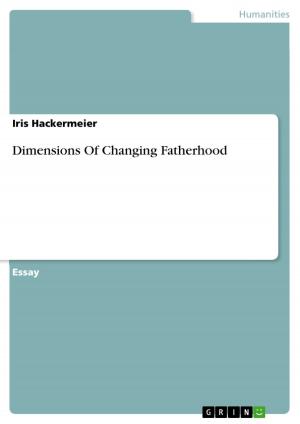A neorealist assessment of India´s Look East Policy
The Balancing of China as a motive for India´s close cooperation with Southeast Asia
Nonfiction, Social & Cultural Studies, Political Science, International, International Relations| Author: | Johanna Bötscher | ISBN: | 9783640892006 |
| Publisher: | GRIN Publishing | Publication: | April 13, 2011 |
| Imprint: | GRIN Publishing | Language: | English |
| Author: | Johanna Bötscher |
| ISBN: | 9783640892006 |
| Publisher: | GRIN Publishing |
| Publication: | April 13, 2011 |
| Imprint: | GRIN Publishing |
| Language: | English |
Master's Thesis from the year 2011 in the subject Politics - International Politics - Region: Near East, Near Orient, grade: 1, University of Salzburg (Fachbereich für Politikwissenschaft und Soziologie), language: English, abstract: In line with its new foreign policy after the end of the Cold War India started to significantly increase its political, economic and military relations with Southeast Asia at the beginning of the 1990ies. Since then, but particularly for the last ten years this so-called 'Look East Policy' has grown to a strong and multifaceted partnership that constitutes a major component of Indian foreign policy today. The principal purpose of this thesis is to evaluate India's motives for its strong interactions with Southeast Asia. The most common approach among academics to explain India's Look East Policy follows a liberal understanding of International Relations. Liberals argue that both, India and the Southeast Asian countries want to exploit complementarities in their economic and social structures: This thesis however, follows a neorealist understanding of International Relations by arguing that the Look East Policy is primarily a strategy of the Indian government to counterbalance the growing Chinese influence in Southeast Asia: Due to the geographic closeness of the Asia Pacific region to the Indian subcontinent, China's presence there is particularly worrisome for India. It thus aligns with the Southeast Asian states in order to push back the Chinese power. In addition to evaluate the motives for India's Look East Policy, the aim of this thesis is also to confute the liberal critiques on the balance of power theory and to show that the conception has still an enormous predicative power also in the twenty-first century. (Neorealist Balance of Power/Balance of Threat Theory). Moteover, while most existing publications using the balance of power theory mainly focus on balancing for political and military power this thesis also takes into account balancing for economic strength. It thus offers a broader approach by also explaining foreign economic policy. The thesis tests the neorealist balance of power theory by applying it to two case studies: On the one hand the negotiation process on the India-ASEAN Free Trade agreement in goods will be examined, on the other hand India's cooperation with Myanmar during the last ten years will be analysed in detail.
Master's Thesis from the year 2011 in the subject Politics - International Politics - Region: Near East, Near Orient, grade: 1, University of Salzburg (Fachbereich für Politikwissenschaft und Soziologie), language: English, abstract: In line with its new foreign policy after the end of the Cold War India started to significantly increase its political, economic and military relations with Southeast Asia at the beginning of the 1990ies. Since then, but particularly for the last ten years this so-called 'Look East Policy' has grown to a strong and multifaceted partnership that constitutes a major component of Indian foreign policy today. The principal purpose of this thesis is to evaluate India's motives for its strong interactions with Southeast Asia. The most common approach among academics to explain India's Look East Policy follows a liberal understanding of International Relations. Liberals argue that both, India and the Southeast Asian countries want to exploit complementarities in their economic and social structures: This thesis however, follows a neorealist understanding of International Relations by arguing that the Look East Policy is primarily a strategy of the Indian government to counterbalance the growing Chinese influence in Southeast Asia: Due to the geographic closeness of the Asia Pacific region to the Indian subcontinent, China's presence there is particularly worrisome for India. It thus aligns with the Southeast Asian states in order to push back the Chinese power. In addition to evaluate the motives for India's Look East Policy, the aim of this thesis is also to confute the liberal critiques on the balance of power theory and to show that the conception has still an enormous predicative power also in the twenty-first century. (Neorealist Balance of Power/Balance of Threat Theory). Moteover, while most existing publications using the balance of power theory mainly focus on balancing for political and military power this thesis also takes into account balancing for economic strength. It thus offers a broader approach by also explaining foreign economic policy. The thesis tests the neorealist balance of power theory by applying it to two case studies: On the one hand the negotiation process on the India-ASEAN Free Trade agreement in goods will be examined, on the other hand India's cooperation with Myanmar during the last ten years will be analysed in detail.















